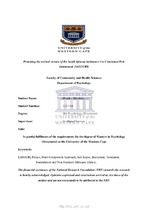| dc.contributor.advisor | Florence, Maria | |
| dc.contributor.author | Hendricks, Shadley | |
| dc.date.accessioned | 2019-02-11T09:38:26Z | |
| dc.date.available | 2019-02-11T09:38:26Z | |
| dc.date.issued | 2018 | |
| dc.identifier.uri | http://hdl.handle.net/11394/6568 | |
| dc.description | Magister Psychologiae - MPsych | en_US |
| dc.description.abstract | Substance use is a major problem in South Africa, particularly within the Western Cape. The problem of substance use is prominent amongst adolescents in low socio-economic-status communities, and these prevalence rates are increasing. Literature regarding the onset of substance use is often limited and inadequate. It is for this reason that the South African Substance Use Contextual Risk Instrument (SASUCRI) was developed and employed to assess factors which contribute to adolescent substance use. The SASUCRI is a measure of the individual and contextual factors associated with adolescent substance use. It was developed to be used in low socio-economic-status communities to identify adolescents at risk for substance use as well as communities in which these risk factors are present. The initial validation study reports on the validity evidence for this instrument. The initial study identified items to be rewritten to improve the validity of the instrument. It further recommended the inclusion of additional items to improve reliability in some sub-scales. This contributed to the current study. The purpose of this study was to pretest the new and revised items. The researcher pretested both the English and the Afrikaans’s revised sub-scales of the SASUCRI. The following sub-scales were pretested; “School as support” (6 items), “School as a stressor” (6 items), “Tolerance for soft drugs” (6 items), Hopelessness individual”(11 items) and “Hopelessness community” (5 items). The theoretical framework employed was the Multi-Component Approach. The framework guided the data collection, analysis and partially the discussion of the findings. The study was of a qualitative nature. Two schools were selected from low socio-economic status communities. The study had 32 high school learners who participated. There were 4 focus groups conducted in total. | en_US |
| dc.language.iso | en | en_US |
| dc.publisher | University of the Western Cape | en_US |
| dc.subject | Sub-scales | en_US |
| dc.subject | Instrument | en_US |
| dc.subject | Validation | en_US |
| dc.subject | Substance | en_US |
| dc.subject | Western Cape | en_US |
| dc.title | Pretesting the revised version of the South African Substance Use Contextual Risk Instrument (SASUCRI) | en_US |
| dc.rights.holder | University of the Western Cape | en_US |

